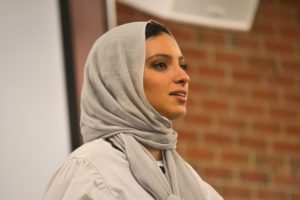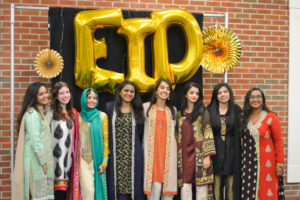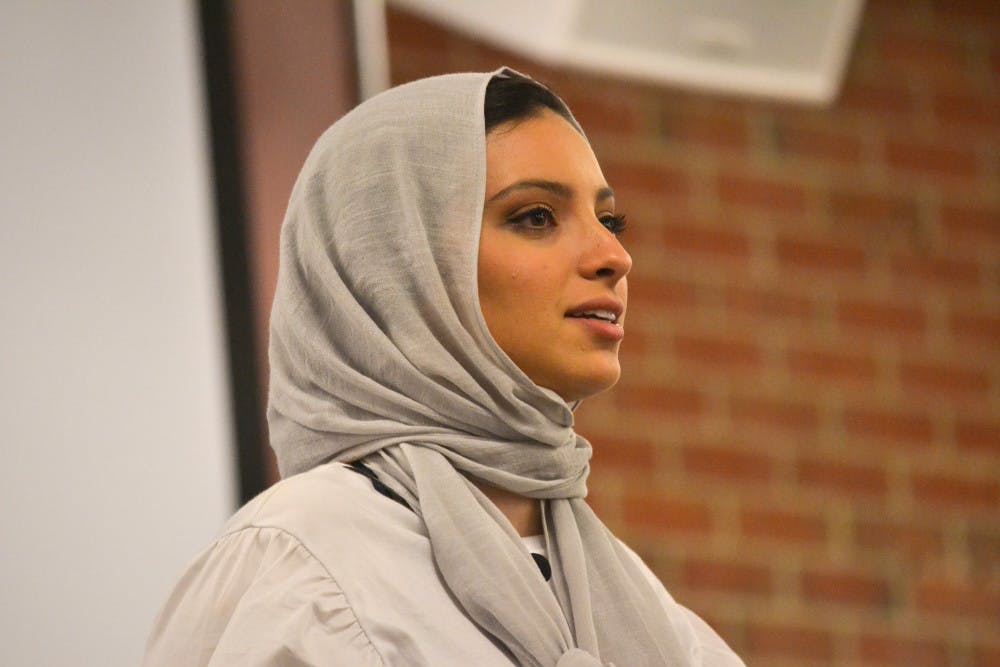By Caroline King
Correspondent
The aroma of traditional Middle Eastern food filled the room as students mingled and found their seats, all while showing off their eccentric headscarves, beaded sarees and traditional kurtas.
Students flocked to the Decker Social Space on Oct. 5 for the Muslim Student’s Association’s 12th annual Eid Dinner.
Eid serves as one of the most important holidays for Islam. There are two Eid holidays in Islamic culture. The first, Eid al-Fitr, marks the end of the Ramadan season. The second, Eid al-Adha, is celebrated after the Hajj, the Muslim pilgrimage to Mecca, and was the most recent to occur.
The guest speaker for the evening was Muslim journalist Noor Tagouri, who chatted with students prior to her presentation as trays filled with Arab, Indian, Pakistani and Afghan food were set up.

Amaly ElMenshawy, a sophomore elementary education and history double major and one of the event’s coordinators, was excited to hear Tagouri speak. She expressed her respect for “hijabi women breaking barriers.”
ElMenshawy was pleased with the simple process of bringing Tagouri to campus.
“(The) negotiation process that took place over the summer wasn’t as difficult as it has been in the past for fellow clubs and other events on campus,” ElMenshawy said.
The event was not solely tailored to Muslims, but for anyone interested in learning about the culture. ElMenshawy believes, given the current events in the United States, now is a great time for students to learn more about the Islamic culture.
“It’s such a heated time in our country, and we rely on the phobia of each other and our differences,” ELMenshawy said. “Noor is breaking barriers through storytelling, and it’s important for all students to hear about her journey.”
The chatter of students subsided as Tagouri took to the stage. She discussed her career as a journalist and the difficulties she has faced along the way.
Being a woman in a male dominated industry is a challenge, but being a woman who dons a headscarf in an industry that “often misrepresents marginalized people” can be much more challenging.
Tagouri’s presentation featured “10 Ways to Influence Impact.”
Once an outsider in LaPlata, Maryland, a small, predominantly white town, Tagouri became a journalist who worked for Newsy. At Newsy, Noor hosts different segments — including “A Woman’s Job” and “A Woman’s Debrief” — that portray underlying themes of hope and inclusiveness.
Her message to the audience of the Decker Social Space contained similar themes, as she hoped to offer encouragement to doubtful students.
“What society says hinders you can be used as motivation to be the best in your field and crushing it,” Tagouri said.
Despite her success, Tagouri has worked through many difficulties — many of which stemmed from misunderstandings about her Islamic culture.
While preparing to appear on a French talk show, Tagouri tweeted to her followers to encourage them to tune into the show.
Unaware that a woman wearing a headscarf would be on the program, network executives decided to pull Tagouri’s segment from airing on television.

Tagouri believes that discriminatory difficulties have made her a better journalist. The incident also inspired countless girls and women who wear headscarves to write to Noor, either to thank her or seek advice.
With the media often misrepresenting the Islamic faith, Tagouri feels that Muslims need to open up about their own experiences.
“(The media should) let the right people tell their stories, (because) too many marginalized groups are underrepresented in the media,” Tagouri said.
Non-Muslim students also attended the Eid Dinner to learn more about the culture and get a taste of the various foods the event had to offer.
Leah Lafevre, a junior art education major, was interested in the dinner because many of her friends are Muslim.
“What’s important to them is important to me,” Lafevre said. “It’s important to be open-minded, especially within this past year. I think it’s nice to experience other cultures and see what other people from other religions celebrate.”
The Eid Dinner helped bring a story of one Muslim woman’s trials and tribulations to the forefront, while simultaneously bringing students from all religions and cultures together to celebrate the holiday.







